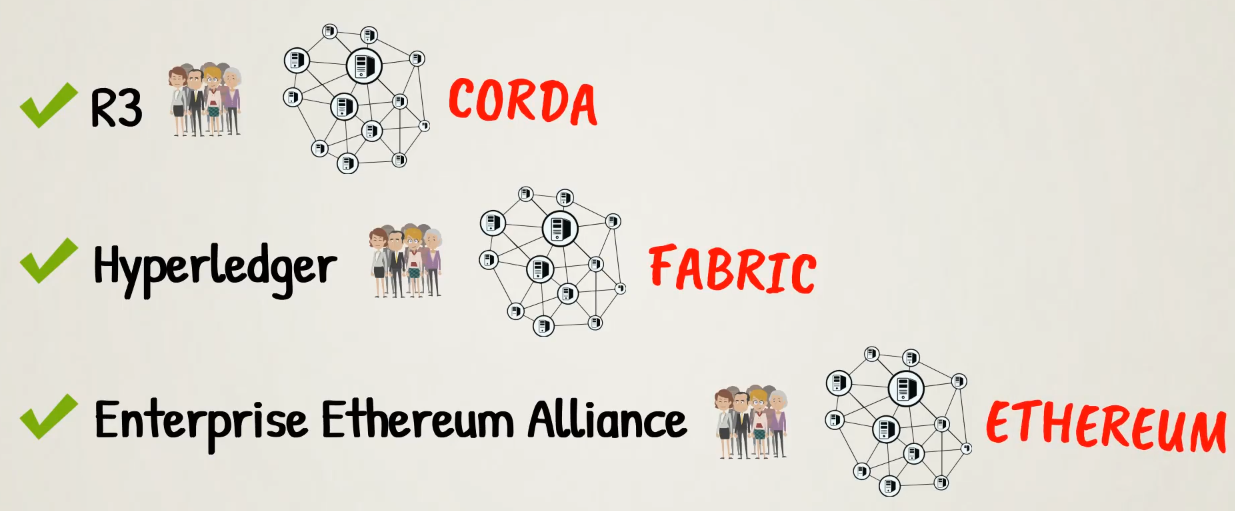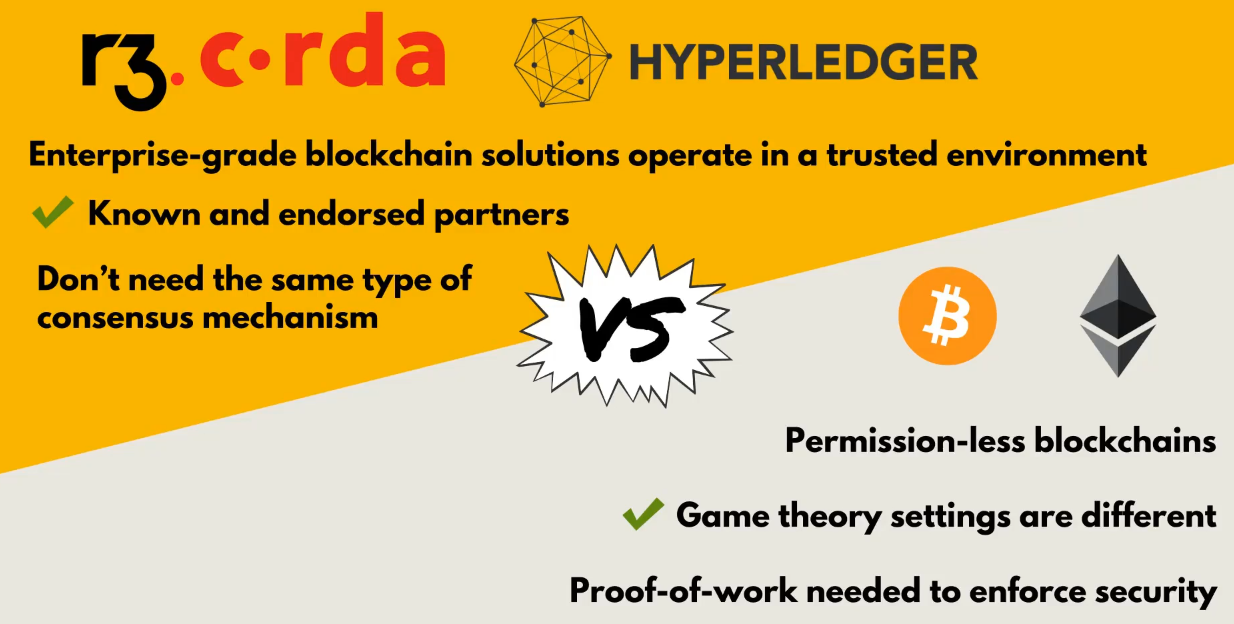This will conclude our overview of industrial private blockchain projects. To recap, in the previous sections, we presented three leading initiatives for developing and promoting enterprise-grade blockchain technology for industrial use: R3, Hyperledger, and EEA. Each has its own community of members, developers, and other contributors, and they all have their own version of foundational blockchain technology serving as a basis for further ecosystem development, as shown in the following diagram:

The premise, upon which Hyperledger Fabric, R3 Corda, and other private permissioned blockchain projects build upon, is that enterprise-grade blockchain solutions will operate in a trusted environment. This is due to the nature of how businesses tend to operate in the real world with known and endorsed partners. This premise has implications on the architecture of private permissioned blockchains, which is different from that of public permission-less blockchains such as Bitcoin and Ethereum. The game theory settings in these two scenarios are different.
Public blockchains, open to everyone, need a complex consensus mechanism with a native cryptoasset, such as PoW, to enforce the security of the network – in other words, to ensure that all participants are incentivized to play by the rules.
Private blockchains, where all participants are pre-approved, don't need the same type of consensus mechanism, nor cryptocurrency. Instead, other factors, such as trusted business relationships, build trust in the system, which is a more traditional approach.
So, having examined both public and private blockchains, we can conclude that there's a significant conceptual difference between them and it's mainly in the approach to how they build trust in the system, as seen in the following diagram:

Public blockchains have introduced a real breakthrough solution to an existential global problem – how to transfer value among unknown parties, without a need for the parties to trust each other, and without the presence of a central authority. In contrast, private blockchains take some of the innovations of public blockchains, such as decentralized peer-to-peer transaction settlement and smart contacts, and bring these to a familiar corporate environment of trusted business partners.
It can be argued that the pioneering public blockchains introduced brilliant and disruptive technological solutions, which have their own challenges to achieve mass adoption, in terms of scalability, interoperability, privacy, and governance. They are, however, the most decentralized economic systems the world has ever known.
Private blockchain projects introduce their own solutions to the issues of scalability, interoperability, privacy, and governance, which their public peers have, but this is at the cost of less decentralization. They bring some of the benefits of public blockchains to the traditional setting of corporate walled gardens and restricted-access networks. But this creates single points of failure. What if a system administrator that's in charge of granting access to the corporate network gets hacked or otherwise corrupted? How many large corporations and government organizations have had their internal IT systems compromised in the past? The list is very, very long.
In this sense, we can compare public blockchains to the internet, and private blockchains to corporate intranets. While private blockchain technology will most likely bring great efficiencies and cost savings to the established players in finance and industry, with things such as optimizing their internal processes and supply chains, this would still have a mild effect in comparison to how public blockchains might be able to change the world. These two paths represent the difference between a gradual evolution and a disruptive revolution.
So, what does the future hold? As always, the reality is probably in the middle. Private blockchains have their own merits in the current business environment and are being designed for user-friendly adoption by organizations in their present shape and form, without too much costly and unnecessary corporate restructuring. On the other hand, public blockchains have the potential to completely change the way business, as we know it, is done, and redesign the economic landscape. To reach that point, however, they will need to address some pressing issues limiting their development and mass user adoption. These are the issues we already mentioned, but it's worth repeating them because they are so critical: scalability, interoperability, privacy, and governance. There are a number of projects, currently in development, that are trying to resolve these issues. They are being advanced by the development teams of leading established public blockchains, such as Bitcoin and Ethereum, as well as by a bunch of new ambitious projects aiming to lead the next generation of blockchain technology.
The race is open, and competition is heated. Who will succeed first? Do private permissioned blockchains hold the keys to corporate success? Will open public blockchains completely change the way we do business and reshape the concept of a business enterprise as we know it? If so, which public blockchains will be the winners? Will Bitcoin and Ethereum preserve their leadership or will they get replaced by a new competitor? Is it going to be a winner-takes-all game, or are we going to have a more decentralized landscape in line with the fundamental principle of this new technology? After all, we already have huge tech monopolies with unbelievable market power, such as Google, Amazon, and Facebook. Why does the world need to invent a great new decentralized way of doing things, just to replace the old corporate behemoths with new ones? How will the future business landscape look?
Perhaps we'll have hybrid implementations of public and private blockchains. Some projects have already envisioned this solution and are trying to build it in their business models. Maybe we can take a look at the auto industry for a useful example – electric vehicles are widely proclaimed as the future, but currently we have a market with traditional cars running on gas, electric cars, and hybrids. This shows that innovation that completely replaces pre-existing solutions doesn't happen overnight.